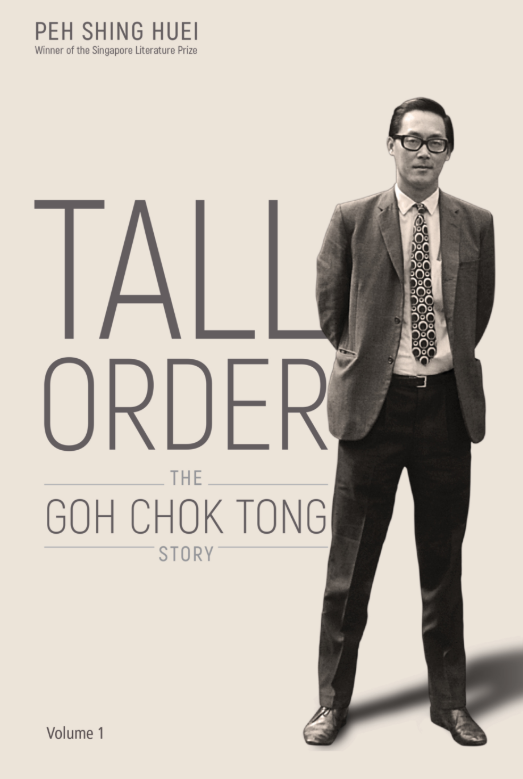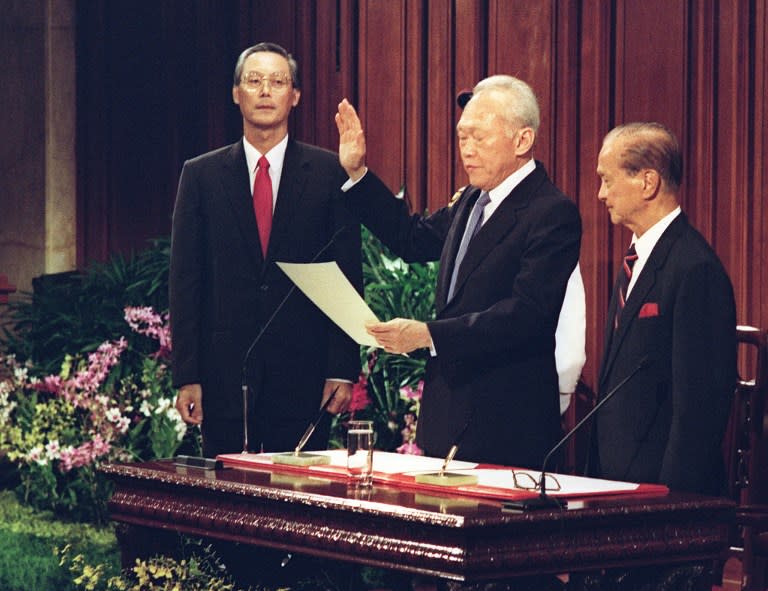Book review – Tall Order: The Goh Chok Tong Story

Some 28 years on, it is easy to forget the size of the task that Goh Chok Tong was given when he succeeded Lee Kuan Yew as Singapore’s prime minister in 1990.
Goh was replacing a man who had been in the job for 25 years and who ruled by his intellect and sheer force of will. He was stepping into, as Goh put it in an interview in 1990, Lee’s “size 20, size 30” shoes.
And he was often derided as a “seat warmer” – a term Goh alludes to himself in his memoirs – for the man who would eventually be next in line: Lee’s son Hsien Loong. This was compounded by the fact that both Lees became key members of Goh’s Cabinet.
Now, after countless books by and about Lee, we finally get to hear Goh’s side of the story with Tall Order: The Goh Chok Tong Story. The first volume of the Emeritus Senior Minister’s memoirs, by former Straits Times journalist and Singapore Literature Prize winner Peh Shing Huei, is now out on bookshelves. It covers Goh’s life and career until he became PM.
Written in a spare, unadorned style befitting of Peh’s previous profession, Tall Order nevertheless provides some fascinating insights into the man who served as PM from 1990-2004, and who was thought by an old schoolmate to be too “shy” to join politics.
While the various revelations of the book – Lee Wei Ling was suggested as a political candidate by her father, for example – have been written about extensively by various media outlets, it is Goh’s sometimes complicated relationship with the late Lee – “my mentor, master and teacher” – that is the beating heart of the narrative. It stretches all the way back to 1958, when Goh first met him as a schoolboy.
As Goh puts it, “How I survived working under him is more than a matter of curious interest.”
Goh and Lee

“I never doubted his honesty, motive and integrity. I never doubted that he wanted me to succeed,” says the 77-year-old when asked about Lee’s revelation at the 1988 National Day Rally that Goh was not his first choice as successor. Though it left him “perplexed, stunned and dumbfounded”, he tells Peh that he “swallowed his medicine without bitterness”.
But in another chapter, he admits to feeling wariness about his position despite being publicly announced as Lee’s successor. “Lee Kuan Yew was a very Machiavellian leader. After a while, it was possible that Lee Hsien Loong would take over. How would you know?”
And despite being the anointed successor, tensions with Lee were never too far away. On one occasion, during the alleged Marxist conspiracy of 1987, Goh took 24 hours to deliberate and respond when the alleged conspirators claimed that their confessions had been made under duress. Lee was away at the time and unable to reach Goh, who was acting PM, on the phone.
He later angrily told Goh at a Cabinet meeting, “If Loong is not my son, I would have asked him to take over from you now.”
Goh’s “kinder and gentler” style, a signature phrase he adopted in 1988, also stands in stark contrast to Lee’s knuckleduster approach. His voice and speech coach Sue Greenwood recalled, “He said ‘Lee Kuan Yew does not have to the time to deal with people he has written off. But I want to do it my way. I don’t want to hurt people’.”
But Goh is very much schooled in Lee’s philosophy. “We would fight you tooth and nail on your wrong-headed and populist approach,” he says of opposition figures who propose what he sees as fundamentally wrong policies.
Learning to communicate
Online commenters have not been kind to Goh in recent years, particularly in light of his comments about ministerial pay in August. But in Tall Order, he comes across as candid, modest and self-deprecating, with numerous individuals testifying to his good-natured ways. “He is a typical Singapore boy who went to a neighbourhood school and who speaks with the Singapore tune and rhythm,” says academic and diplomat Chan Heng Chee, his old NUS schoolmate.
Peh, who conducted 12 interview sessions with Goh from mid-2017 to early 2018 for the book, notes that the father of two has a “chronic unwillingness” to inflate his personal work and achievements. He also readily acknowledges his difficulties with communicating at the start of his political career. “Once the TV camera was on me, I just could not speak or think.”
Greenwood even remarked, “He had no understanding of how to persuade an audience.” Lee’s criticism in 1988 that he was “wooden” also prompted him to redouble his efforts at improving his communication skills.
But perhaps the most relevant topic addressed in the book is that of leadership succession, in light of the fact that Singaporeans still do not know who will be the country’s next leader. By contrast, Goh was anointed as primus inter pares – first among equals – by his peers a full six years before he became PM.
In an email response to Yahoo News Singapore‘s query on whether he appreciated the amount of time he had to get ready, Goh said, “Certainly. On hindsight, it was valuable to go through the ups and downs. The political crucibles completed my journey, toughened me and made me who I am. At the end of it all, the most important lesson is that you must have self-belief and a sense of mission.”
Related stories
Having 3 Lees in Cabinet would have made my job difficult: Goh Chok Tong
I asked Ho Ching to enter politics: Goh Chok Tong
Lee Kuan Yew told me to take lessons from Machiavelli’s ‘The Prince’: Goh Chok Tong



